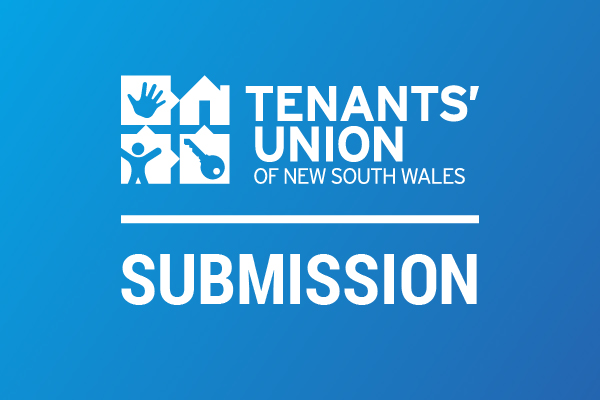Submission: Draft Boarding House Act 2012 Regulation
01/05/2013
The Tenants' Union of NSW generally supports the draft Regulation, subject to the recommendations and other points discussed below.
In addition, we submit that a standard form occupancy agreement for assisted boarding houses should be approved. It should be based on the draft standard form occupancy agreement for general boarding houses recently circulated by NSW Fair Trading (subject to certain amendments recommended by the Tenant’s Union to NSW Fair Trading) with additional terms that reflect the requirements and standards of the Boarding Houses Act 2012 (the BH Act) and the Boarding Houses Regulation.
This would mean that those requirements and standards, which are enforceable by NSW Ageing, Disability and Home Care as statutory obligations, could also be enforced by residents as contractual obligations. This would strengthen the program of reform that the BH Act represents.
Conditions relating to provision and display of information (cl 15)
As they are currently drafted, each of these clauses assumes use of an occupancy agreement. However, the BH Act provides for the use of both occupancy agreements and ‘rental agreements’ (this means, for present purposes, a residential tenancy agreement under the Residential Tenancies Act 2010 (NSW)).
We recommend:
- At cl 15(2), after the words ‘occupancy agreement’, insert ‘or rental agreement’.
- At cl 22, insert a new subclause (3): ‘this clause applies to “rental agreements”, within the meaning of Part 3 of the Act, as if they were occupancy agreements.’
Condition relating to notification of additional needs residents (cl 18)
In the case of a resident evicted immediately because of violence, this clause would not require notification to the Director-General any sooner than seven days after the eviction. We submit that this is too slow a response where a person is unwell, homeless and violent.
We recommend that notification be required within seven days of the proprietor issuing the notice, or immediately upon eviction, whichever occurs first.
Reporting requirements (Part 3, Division 6)
We submit that proprietors of pre-existing assisted boarding houses (as defined at Sch 1, cl 5(1)) should be required to report on their plans for complying with the new requirements relating to the maximum number of residents (Sch 1, cl 6) and sleeping arrangements (Sch 1, cl 7).
We recommend the insertion of a new clause in this Division to require the proprietor of a pre-existing assisted boarding house to report on their plans for complying with those new requirements not later than 12 months before the date on which those requirements will apply.
Application of Division [1 – Housing of residents] to pre-existing assisted boarding houses
Clause 5(2) provides for a delay of five years in the application of the new requirements at cls 6 and 7 to pre-existing authorised assisted boarding houses.
We submit that five years is generous to proprietors of pre-existing boarding houses; in fact, we submit that a shorter period would be appropriate, particularly in relation to the requirements at cl 7, which would involve less substantial changes to a proprietor’s operations. Certainly no longer period of delay should be contemplated.
Maximum number of residents (Sch 1, cl 6)
We support, as a step towards the elimination of large-scale congregated accommodation for people for disability, limiting to 30 the maximum number of residents of an assisted boarding house.
We note, however, that premises with more than 20 residents are still considered ‘large’ on ADHC’s own definitions. We would support reducing to 20 the maximum number of residents, either in place of the 30-resident maximum provided by the cl 6; or successively to the 30-resident maximum, so that after a further, say, five years, the maximum number will be reduced from 30 to 20 residents.
Sleeping arrangements (Sch 1, cl 7)
We support, as a measure against the institutionalising effect of accommodation in assisted boarding houses, providing generally that each resident is entitled to their own bedroom.
We submit that the provision at cl 7(1)(b)(i) for two residents to share a bedroom where ‘the residents know each other and have requested a shared bedroom’ sets too low a threshold for the exception to the general requirement. We recommend instead allowing the exception only where the residents are spouses, partners or a family group, and have requested the shared bedroom.
Heating and electrical equipment (Sch 1, cl 8)
As it is currently drafted, clause 11(2) does not require the provision of heating or cooling equipment – it merely requires that if heating equipment is provided that it be appropriate to the climate and temperature.
We recommend: replace existing subclause (2) with ‘Heating and/or cooling equipment appropriate to the climate and temperature must be provided.’
Communal space (Sch 1, cl 16)
This clause would require provision of only one communal space, which may be located outside. We submit that this is insufficient, and that at least one internal communal space, apart from the dining room, be required to be provided and furnished with a television, radio, books, games and sofas.
Private or quiet rooms (Sch 1, cl 18)
We submit that a private or quiet room should be available to any additional needs residents, without qualification as to whether they share a bedroom. Few people in the wider community receive visitors in their bedrooms; residents of assisted boarding houses should not have to do so.
Food preparation areas (Sch 1, cl 19)
This clause describes a food preparation area that stops of being a fully-equipped and stocked kitchen. We submit that providing residents with access to a kitchen that is fully-equipped and stocked with ingredients for making snacks and meals is a simple measure against institutionalisation, and should be required.
Laundry (Sch 1, cl 20)
This clause would not require a laundry to be maintained onsite, and instead allow all laundry to be done offsite.
We submit that providing residents with access to a laundry onsite is a simple measure against institutionalisation, and should be required.


